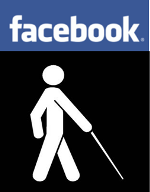 Facebook is working together with the American Foundation for the Blind (AFB) to make its social networking service more accessible to users who are blind or visually impaired. In a company blog post, the non-profit organization’s President, Carl Augusto, explains which problems visually challenged users encounter when surfing the web and how they’re able to overcome these issues with the help of website publishers, developers and designers.
Facebook is working together with the American Foundation for the Blind (AFB) to make its social networking service more accessible to users who are blind or visually impaired. In a company blog post, the non-profit organization’s President, Carl Augusto, explains which problems visually challenged users encounter when surfing the web and how they’re able to overcome these issues with the help of website publishers, developers and designers.
This makes sense from Facebook’s perspective too, of course. There are a lot of visually impaired people on the planet, and they want to connect to their friends, relatives and peers just as much as you and me.
According to stats provided by the AFB, there are over 20 million Americans who have reported experiencing significant vision loss.
Augusto writes:
You may be wondering how people with vision loss use computers or surf the web. The answer is quite simple: People who are blind or visually impaired use a screen magnification program to enlarge fonts in order to optimize the screen for reading, or they use a screen reading program that reads the text aloud. These are quick, efficient and helpful solutions — that is, if the websites and computer programs are properly designed.
The challenge is that not all Web pages are compatible with screen readers and magnifiers. When a website is built without regard to accessible design, screen reading software cannot interpret the information, which prevents the blind person from accessing the site. Social networking sites present some especially difficult challenges. For instance, images are an important part of the site experience, but it is rare that photos get described. Even while in the middle of reading a page, comments or links can change in ways that are undetectable to the screen reader or fall outside the viewing window of screen-magnification.
Facebook has been working with the organization for 2 years, and so far this had led to a number of improvements which are listed here. In the blog post, Augusto writes that they’re also working together with Facebook to implement some design changes that will make the site more usable for people with visual impairments. I have a feeling they won’t be starting Facebook Groups and Polls against these changes.
I quickly looked for pages on MySpace and Bebo where they indicate that they’re committed to making the user experience for visually impaired members better, but didn’t immediately find anything. Google, on the other hand, tackles usability issues extensively, and is for example experimenting with a custom search engine for blind or visually challenged users.
We’re not here to lecture anyone, but if you’re building websites and Web applications, you might want to keep into consideration that there are millions of people who could potentially be using them, provided you make it possible for them to do so. AFB Consulting can help you with that.